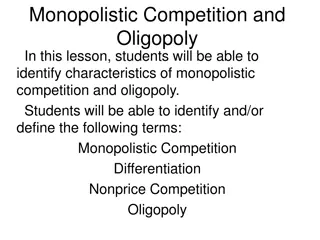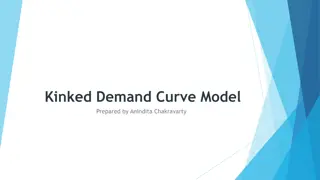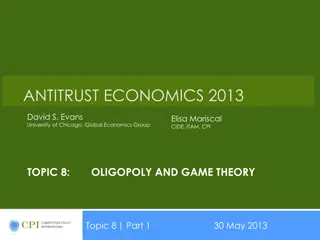OLIGOPOLY
Dive into the complex dynamics of oligopoly markets with a focus on strategic behaviors, competitive interactions, and their broader economic impacts. Explore how firms in oligopolies navigate pricing strategies, collusion risks, and the challenges of market dominance. Gain valuable insights into market equilibrium, pricing wars, and regulatory considerations within this unique market structure. Understand the strategic decisions made by firms to maximize profits and enhance market power in the face of limited competition.
Download Presentation

Please find below an Image/Link to download the presentation.
The content on the website is provided AS IS for your information and personal use only. It may not be sold, licensed, or shared on other websites without obtaining consent from the author.If you encounter any issues during the download, it is possible that the publisher has removed the file from their server.
You are allowed to download the files provided on this website for personal or commercial use, subject to the condition that they are used lawfully. All files are the property of their respective owners.
The content on the website is provided AS IS for your information and personal use only. It may not be sold, licensed, or shared on other websites without obtaining consent from the author.
E N D
Presentation Transcript
OLIGOPOLY Chapter 15
In some markets, there are only a few firms compete. For example, computer chips are made by Intel and Advanced Micro Devices and each firm must pay close attention to what the other firm is doing. How does competition between just two chip makers work?
INTHISCHAPTERYOUWILLLEARN The key characteristics of oligopoly; Use game theory to model the strategic behavior of oligopoly firms;
CHARACTERISTICS OF OLIGOPOLY Oligopoly is a market structure where few firms compete and strategically interact. Firm considers effects of its actions on behavior of others and actions of others on its own profits. Characteristics: products can be differentiated or identical. Collusion becomes possible => Cartel: is a group of firms acting together to limit output, raise price, and increase profit. Example: OPEC Natural or legal barriers prevent the entry of new firms. 4
CHARACTERISTICS OF OLIGOPOLY This figure shows how a natural duopoly a market with two firms, may be created.
OLIGOPOLY GAMES Game theory analyzes strategic behavior, which is the behavior that takes into account the expected behavior of others and the mutual recognition of interdependence. The four features of a game: Rules: specify permissible actions by players. Strategies: actions such as raising or lowering price, output, advertising, research and development, etc. Payoffs: profits. Outcome: determined by player choices.
OLIGOPOLY GAMES The Prisoners game Rules two prisoners (Art and Bob) have been caught committing a petty crime. Each is held in a separate cell and cannot communicate with each other.
OLIGOPOLY GAMES Each is told that both are suspected of committing a more serious crime. If one of them confesses, he will get a 1-year sentence for cooperating while his accomplice get a 10-year sentence for both crimes. If both confess to the more serious crime, each receives 3 years in jail for both crimes. If neither confesses, each receives a 2-year sentence for the minor crime only.
OLIGOPOLY GAMES Strategies Art and Bob each have two possible actions: 1. Confess to the larger crime. 2. Deny having committed the larger crime. With two players and two actions for each player, there are four possible outcomes: 1. Both confess. 2. Both deny. 3. Art confesses and Bob denies. 4. Bob confesses and Art denies.
OLIGOPOLY GAMES A Nash equilibrium is an outcome in which each player takes best possible action given the other player s action. The prisoner s game has a dominant strategy (unique best strategy independent of other player s action): to confess, which is not the best interests of the players. Reason: lack of cooperation. Incentive to cheat could lead to the collapse of collusion => experience of OPEC
The payoff matrix for this game: Nigeria Low High output output output Low Saudi Arabia 100 10 75 15 output High 80 7 60 10 13
CANFIRMSESCAPETHEPRISONERS DILEMMA? An example of Walmart and Supterstore competing on the sales of PS 4 game console.
The payoff matrix for this game: Superstore Superstore $400 $400 $300 $300 $400 $400 $10,000 $10,000 $5,000 $15,000 $10,000 $10,000 $7,500 $7,500 Walmart Walmart $300 $300 $15,000 $5,000 $7,500 $7,500 $7,500 $7,500 $7,500 $7,500 15
CANFIRMSESCAPETHEPRISONERS DILEMMA? Implicit collusion: cooperation without explicit agreement => price matching, price leadership. Canada s Not-So Friendly Skies: why in-country flights in Canada are more expensive?
SEQUENTIAL GAMESANDBUSINESS STRATEGY Sequential games: in many business situations, in stead of moving simultaneously, one firm will act first, and then other firms will respond. An example of using sequential game theory to analyze deterring entry: Apple and Dell competing on very thin and very light laptop computers.
DISCUSSION QUESTIONS What is the key difference between monopolistic competition and oligopoly? Assume that you are in an industry that is monopolistically competitive. What actual steps you might take to transform your industry into a more oligopolistic form?
DISCUSSION QUESTIONS Evidence suggests that the profits earned by all the firms in many oligopolistic industries are less than the profits that would be earned if the industry were monopolized. What are some reasons why this might be so?
DISCUSSION QUESTIONS Consider the following industries in Canada that have traditionally been oligopolistic. What are the barriers to entry in each of these industries that might explain persistently high profits? Brewing Airlines Banking Internet service providers;
 undefined
undefined










